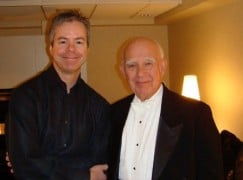‘He redefined the meaning of concertmaster’
mainFrank Almond, the Milwaukee concertmaster, has written a beautiful memoir of Joseph Silverstein, the Boston legend who died yesterday, aged 83.
In 1979 I was 15 years old and not sure I wanted to play the violin any more; I was in my hometown of San Diego coming off a hiatus of about a year or so. The only reason I was hanging in was because I’d just started with a new teacher who somehow intuitively knew that what I really needed was some quality guidance and a highly structured practice regimen. And maybe a summer of hard work. My mom drove me to the local auditions for BU’s Tanglewood Institute, but I had no idea how that summer would change my life.
Read on here.






This is terribly sad news that Joe Silverstein is gone.
I first met him in 1967 and saw him last teaching a master class at Tanglewood last August. He seemed fine and we reminisced about the BSO in the Leinsdorf and Steinberg days. It was Erich Leinsdorf who appointed Joe as concertmaster of the BSO.
Did Mr. Silverstein play under the direction of Charles Munch? Munch himself had been a concertmaster; of the Leipzig Gewendhaus Orchestra, If I remember right. They both began conducting rather late in life.
Joseph Silverstein played under the direction of Charles Munch, but not as
concertmaster. He was a section player and also appeared as soloist a
couple of times with Munch conducting.
There was an interesting profile of Joseph Silverstein in the November 2007 edition of The Strad. One particular point has stayed with me ever since:
“While I was at Curtis I also had William Primrose as my chamber instructor. He had a little catechism which still stays with me and which I repeat to my students ad nauseam: ‘A proper musical note has to have a predetermined pitch, a predetermined length, a predetermined dynamic and a predetermined relationship to the notes and silences that surround it. If it doesn’t have thiose four ingredients, its simply not a proper note’. So even when you’re practising a scale, you have to think about all those elements, rather than simply playing in a motoric fashion.”
Sound advice I think.
http://www.thestrad.com/cpt-latests/violinist-joseph-silverstein-on-studying-with-josef-gingold-and-efrem-zimbalist/